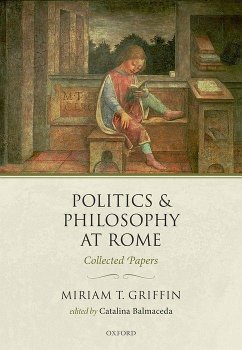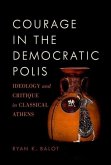- Gebundenes Buch
- Merkliste
- Auf die Merkliste
- Bewerten Bewerten
- Teilen
- Produkt teilen
- Produkterinnerung
- Produkterinnerung
Miriam T. Griffin is an eminent scholar of Roman history and ancient philosophy and an unrivalled pioneer in her work to bridge the two. This collection of her papers focuses on the interplay of philosophy and politics in Rome and represents a fascinating body of work of outstanding intellectual quality and scholarly significance.
Andere Kunden interessierten sich auch für
![Sextus Empiricus Sextus Empiricus]() Sextus EmpiricusSextus Empiricus264,99 €
Sextus EmpiricusSextus Empiricus264,99 €![Proceedings of the Boston Area Colloquium in Ancient Philosophy Proceedings of the Boston Area Colloquium in Ancient Philosophy]() Proceedings of the Boston Area Colloquium in Ancient Philosophy199,99 €
Proceedings of the Boston Area Colloquium in Ancient Philosophy199,99 €![Cicero's Philosophy of History Cicero's Philosophy of History]() Matthew FoxCicero's Philosophy of History282,99 €
Matthew FoxCicero's Philosophy of History282,99 €![Plato's Gorgias: Speech, Soul and Politics Plato's Gorgias: Speech, Soul and Politics]() Plato's Gorgias: Speech, Soul and Politics169,99 €
Plato's Gorgias: Speech, Soul and Politics169,99 €![Courage in the Democratic Polis Courage in the Democratic Polis]() Ryan K BalotCourage in the Democratic Polis156,99 €
Ryan K BalotCourage in the Democratic Polis156,99 €![Arius Didymus on Peripatetic Ethics, Household Management, and Politics Arius Didymus on Peripatetic Ethics, Household Management, and Politics]() Arius Didymus on Peripatetic Ethics, Household Management, and Politics203,99 €
Arius Didymus on Peripatetic Ethics, Household Management, and Politics203,99 €![The Oxford Handbook of the Second Sophistic The Oxford Handbook of the Second Sophistic]() The Oxford Handbook of the Second Sophistic246,99 €
The Oxford Handbook of the Second Sophistic246,99 €-
-
-
Miriam T. Griffin is an eminent scholar of Roman history and ancient philosophy and an unrivalled pioneer in her work to bridge the two. This collection of her papers focuses on the interplay of philosophy and politics in Rome and represents a fascinating body of work of outstanding intellectual quality and scholarly significance.
Hinweis: Dieser Artikel kann nur an eine deutsche Lieferadresse ausgeliefert werden.
Hinweis: Dieser Artikel kann nur an eine deutsche Lieferadresse ausgeliefert werden.
Produktdetails
- Produktdetails
- Verlag: Hurst & Co.
- Seitenzahl: 792
- Erscheinungstermin: 18. Dezember 2018
- Englisch
- Abmessung: 249mm x 173mm x 48mm
- Gewicht: 1565g
- ISBN-13: 9780198793120
- ISBN-10: 019879312X
- Artikelnr.: 49086972
- Herstellerkennzeichnung
- Libri GmbH
- Europaallee 1
- 36244 Bad Hersfeld
- gpsr@libri.de
- Verlag: Hurst & Co.
- Seitenzahl: 792
- Erscheinungstermin: 18. Dezember 2018
- Englisch
- Abmessung: 249mm x 173mm x 48mm
- Gewicht: 1565g
- ISBN-13: 9780198793120
- ISBN-10: 019879312X
- Artikelnr.: 49086972
- Herstellerkennzeichnung
- Libri GmbH
- Europaallee 1
- 36244 Bad Hersfeld
- gpsr@libri.de
Miriam T. Griffin was born in New York and studied at Barnard College and Radcliffe before receiving a Fulbright Scholarship to Oxford, where she completed her DPhil under the supervision of Sir Ronald Syme. She was initially the Fulford Research Fellow at St. Anne's College, later being appointed to a tutorial fellowship in Ancient History at Somerville College and a CUF Lectureship in the University, as well as holding a post as Langford Eminent scholar at Florida State University in 2008. She was the editor of The Classical Quarterly from 2002 until 2007 and is a long-standing editor of the Clarendon Ancient History series for Oxford University Press. In 2018, Dr Griffin was posthumously awarded a British Academy Medal for her lifetimes contribution to Roman history and ancient thought. Catalina Balmaceda completed her D.Phil at Brasenose College, Oxford, and is now Associate Professor of Ancient History at Pontificia Universidad Católica de Chile. She is the author of Virtus Romana: Politics and Morality in the Roman Historians (University of North Carolina Press, 2017), Comprender el pasado: una historia de la escritura y el pensamiento histórico (with Jaume Aurell, Peter Burke, and Felipe Soza; Akal, 2013), Sallust: The War Against Jugurtha (with Michael Comber; Liverpool University Press, 2009), and several articles on Roman history and historiography.
Frontmatter
List of Illustrations
List of Abbreviations
PART I: ROMAN HISTORY
Republican History
1: Cicero and Rome
2: The 'Leges Iudiciariae' of the Pre-Sullan Era
3: The Tribune C. Cornelius
4: Introduction to A Companion to Julius Caesar
Imperial History
5: Urbs Roma, Plebs and Princeps
6: The Elder Seneca and Spain
7: Nero's Recall of Suetonius Paullinus
8: Claudius in the Judgement of the Next Half-Century
9: Tacitus, Tiberius and the Principate
10: Nero and the Concept of Imperial Glory
PART II: ROMAN HISTORIOGRAPHY
Published Papers
11: Tacitus as a Historian
12: The Lyons Tablet and Tacitean Hindsight
13: Un Frammento del Libro XI di Tito Livio?
14: Claudius in Tacitus
15: The Senate's Story
16: Pliny and Tacitus
17: Iure Plectimur: The Roman Critique of Roman Imperialism
Unpublished Lectures
18: Writing History: The Senate vs. Tacitus
19: Pliny s Letters: Between History and E-mail
20: Nero: From Zero to Hero
21: Tacitus and Nero
22: Tiberius on Family Relations
Occasional Pieces
23: Obituary of Sir Ronald Syme, 1903-1989
24: Show Us You Care, Ma'am
25: 'Lifting the Mask': Syme on Fictional History
PART III: PHILOSOPHY AND POLITICS
26: Philosophy, Politics, and Politicians at Rome
27: De Brevitate Vitae
28: Seneca on Cato's Politics: Epistle 14.12 13
29: Imago Vitae Suae
30: Philosophy, Cato, and Roman Suicide: I and II
31: Philosophy for Statesmen: Cicero and Seneca
32: The Intellectual Developments of the Ciceronian Age
33: Philosophical Badinage in Cicero's Letters to his Friends
34: Cynicism and the Romans: Attraction and Repulsion
35: When is Thought Political?
36: From Aristotle to Atticus: Cicero and Matius on Friendship
37: The Composition of the Academica: Motives and Versions
38: Seneca and Pliny
39: Piso, Cicero and their Audience
40: Political Thought in the Age of Nero
41: Clementia after Caesar: From Politics to Philosophy
42: De Beneficiis and Roman Society
43: The Younger Pliny's Debt to Moral Philosophy
44: Seneca's Pedagogic Strategy: Letters and De Beneficiis
45: The Elder Pliny on Philosophers
46: The Politics of Virtue: Three Puzzles in Cicero's De Officiis
47: Symptoms and Sympathy in Latin Letter-writing
48: Latin Philosophy and Roman Law
49: The Prince and his Tutor: Candour and Affection
50: Dignity in Roman and Stoic Thought
Endmatter
Bibliography
Index
List of Illustrations
List of Abbreviations
PART I: ROMAN HISTORY
Republican History
1: Cicero and Rome
2: The 'Leges Iudiciariae' of the Pre-Sullan Era
3: The Tribune C. Cornelius
4: Introduction to A Companion to Julius Caesar
Imperial History
5: Urbs Roma, Plebs and Princeps
6: The Elder Seneca and Spain
7: Nero's Recall of Suetonius Paullinus
8: Claudius in the Judgement of the Next Half-Century
9: Tacitus, Tiberius and the Principate
10: Nero and the Concept of Imperial Glory
PART II: ROMAN HISTORIOGRAPHY
Published Papers
11: Tacitus as a Historian
12: The Lyons Tablet and Tacitean Hindsight
13: Un Frammento del Libro XI di Tito Livio?
14: Claudius in Tacitus
15: The Senate's Story
16: Pliny and Tacitus
17: Iure Plectimur: The Roman Critique of Roman Imperialism
Unpublished Lectures
18: Writing History: The Senate vs. Tacitus
19: Pliny s Letters: Between History and E-mail
20: Nero: From Zero to Hero
21: Tacitus and Nero
22: Tiberius on Family Relations
Occasional Pieces
23: Obituary of Sir Ronald Syme, 1903-1989
24: Show Us You Care, Ma'am
25: 'Lifting the Mask': Syme on Fictional History
PART III: PHILOSOPHY AND POLITICS
26: Philosophy, Politics, and Politicians at Rome
27: De Brevitate Vitae
28: Seneca on Cato's Politics: Epistle 14.12 13
29: Imago Vitae Suae
30: Philosophy, Cato, and Roman Suicide: I and II
31: Philosophy for Statesmen: Cicero and Seneca
32: The Intellectual Developments of the Ciceronian Age
33: Philosophical Badinage in Cicero's Letters to his Friends
34: Cynicism and the Romans: Attraction and Repulsion
35: When is Thought Political?
36: From Aristotle to Atticus: Cicero and Matius on Friendship
37: The Composition of the Academica: Motives and Versions
38: Seneca and Pliny
39: Piso, Cicero and their Audience
40: Political Thought in the Age of Nero
41: Clementia after Caesar: From Politics to Philosophy
42: De Beneficiis and Roman Society
43: The Younger Pliny's Debt to Moral Philosophy
44: Seneca's Pedagogic Strategy: Letters and De Beneficiis
45: The Elder Pliny on Philosophers
46: The Politics of Virtue: Three Puzzles in Cicero's De Officiis
47: Symptoms and Sympathy in Latin Letter-writing
48: Latin Philosophy and Roman Law
49: The Prince and his Tutor: Candour and Affection
50: Dignity in Roman and Stoic Thought
Endmatter
Bibliography
Index
Frontmatter
List of Illustrations
List of Abbreviations
PART I: ROMAN HISTORY
Republican History
1: Cicero and Rome
2: The 'Leges Iudiciariae' of the Pre-Sullan Era
3: The Tribune C. Cornelius
4: Introduction to A Companion to Julius Caesar
Imperial History
5: Urbs Roma, Plebs and Princeps
6: The Elder Seneca and Spain
7: Nero's Recall of Suetonius Paullinus
8: Claudius in the Judgement of the Next Half-Century
9: Tacitus, Tiberius and the Principate
10: Nero and the Concept of Imperial Glory
PART II: ROMAN HISTORIOGRAPHY
Published Papers
11: Tacitus as a Historian
12: The Lyons Tablet and Tacitean Hindsight
13: Un Frammento del Libro XI di Tito Livio?
14: Claudius in Tacitus
15: The Senate's Story
16: Pliny and Tacitus
17: Iure Plectimur: The Roman Critique of Roman Imperialism
Unpublished Lectures
18: Writing History: The Senate vs. Tacitus
19: Pliny s Letters: Between History and E-mail
20: Nero: From Zero to Hero
21: Tacitus and Nero
22: Tiberius on Family Relations
Occasional Pieces
23: Obituary of Sir Ronald Syme, 1903-1989
24: Show Us You Care, Ma'am
25: 'Lifting the Mask': Syme on Fictional History
PART III: PHILOSOPHY AND POLITICS
26: Philosophy, Politics, and Politicians at Rome
27: De Brevitate Vitae
28: Seneca on Cato's Politics: Epistle 14.12 13
29: Imago Vitae Suae
30: Philosophy, Cato, and Roman Suicide: I and II
31: Philosophy for Statesmen: Cicero and Seneca
32: The Intellectual Developments of the Ciceronian Age
33: Philosophical Badinage in Cicero's Letters to his Friends
34: Cynicism and the Romans: Attraction and Repulsion
35: When is Thought Political?
36: From Aristotle to Atticus: Cicero and Matius on Friendship
37: The Composition of the Academica: Motives and Versions
38: Seneca and Pliny
39: Piso, Cicero and their Audience
40: Political Thought in the Age of Nero
41: Clementia after Caesar: From Politics to Philosophy
42: De Beneficiis and Roman Society
43: The Younger Pliny's Debt to Moral Philosophy
44: Seneca's Pedagogic Strategy: Letters and De Beneficiis
45: The Elder Pliny on Philosophers
46: The Politics of Virtue: Three Puzzles in Cicero's De Officiis
47: Symptoms and Sympathy in Latin Letter-writing
48: Latin Philosophy and Roman Law
49: The Prince and his Tutor: Candour and Affection
50: Dignity in Roman and Stoic Thought
Endmatter
Bibliography
Index
List of Illustrations
List of Abbreviations
PART I: ROMAN HISTORY
Republican History
1: Cicero and Rome
2: The 'Leges Iudiciariae' of the Pre-Sullan Era
3: The Tribune C. Cornelius
4: Introduction to A Companion to Julius Caesar
Imperial History
5: Urbs Roma, Plebs and Princeps
6: The Elder Seneca and Spain
7: Nero's Recall of Suetonius Paullinus
8: Claudius in the Judgement of the Next Half-Century
9: Tacitus, Tiberius and the Principate
10: Nero and the Concept of Imperial Glory
PART II: ROMAN HISTORIOGRAPHY
Published Papers
11: Tacitus as a Historian
12: The Lyons Tablet and Tacitean Hindsight
13: Un Frammento del Libro XI di Tito Livio?
14: Claudius in Tacitus
15: The Senate's Story
16: Pliny and Tacitus
17: Iure Plectimur: The Roman Critique of Roman Imperialism
Unpublished Lectures
18: Writing History: The Senate vs. Tacitus
19: Pliny s Letters: Between History and E-mail
20: Nero: From Zero to Hero
21: Tacitus and Nero
22: Tiberius on Family Relations
Occasional Pieces
23: Obituary of Sir Ronald Syme, 1903-1989
24: Show Us You Care, Ma'am
25: 'Lifting the Mask': Syme on Fictional History
PART III: PHILOSOPHY AND POLITICS
26: Philosophy, Politics, and Politicians at Rome
27: De Brevitate Vitae
28: Seneca on Cato's Politics: Epistle 14.12 13
29: Imago Vitae Suae
30: Philosophy, Cato, and Roman Suicide: I and II
31: Philosophy for Statesmen: Cicero and Seneca
32: The Intellectual Developments of the Ciceronian Age
33: Philosophical Badinage in Cicero's Letters to his Friends
34: Cynicism and the Romans: Attraction and Repulsion
35: When is Thought Political?
36: From Aristotle to Atticus: Cicero and Matius on Friendship
37: The Composition of the Academica: Motives and Versions
38: Seneca and Pliny
39: Piso, Cicero and their Audience
40: Political Thought in the Age of Nero
41: Clementia after Caesar: From Politics to Philosophy
42: De Beneficiis and Roman Society
43: The Younger Pliny's Debt to Moral Philosophy
44: Seneca's Pedagogic Strategy: Letters and De Beneficiis
45: The Elder Pliny on Philosophers
46: The Politics of Virtue: Three Puzzles in Cicero's De Officiis
47: Symptoms and Sympathy in Latin Letter-writing
48: Latin Philosophy and Roman Law
49: The Prince and his Tutor: Candour and Affection
50: Dignity in Roman and Stoic Thought
Endmatter
Bibliography
Index








